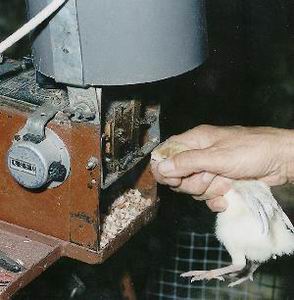Well-mannered chickens keep their beaks to their selves |
| Chickens with intact beaks will pick each other half to death, even if they are given ample space.
One in eight hens dies a premature death because of this.
The question is: Is this pecking behavior genetically determined or should chicks be raised better? Jeroen Trommelen, newspaper De Volkskrant, April 8 2000. |
| It's a good thing that the people who buy biological EKO eggs (EKO is an ecological quality mark) in a Dutch Albert Heijn supermarket, don't visit the farm where the eggs come from.
They might end up at poultry farmer near the Dutch town of Barneveld.
His sheds house laying hens who get exactly what the law on biological farming orders: special food, one square meter of indoor space per six hens, roosts, nests, resting places and a doorway to the outdoors and four square meters of outdoor space per chicken.
There is only one problem.
The chickens pick each other bare and eat each other.
This does not appear very biological and doesn't improve the animals' well-being.
Almost all of them are plucked half bare, while the laying season is far from over.
Probably at least ten percent will not live to see the end of the laying season.
Many other biological poultry farmers have the same problem, so tells the report 'Biologische legpluimveehouderij' ('Biological Poultry Farming'), which was published last month by poultry research station 'Het Spelderholt' in the Dutch town of Beekbergen and the Landbouw-Economisch Instituut (Institute for Agriculture and Economics) in The Hague. In this report the poultry sector explores the biological market because it will most likely grow rapidly in the near future. |
Chicks' beaks are trimmed
Battery cages and in the Netherlands the trimming of beaks will be illegal from 2011 onwards. The fact of the matter is that this is not a painless procedure, as is often thought. It may cause the chickens much suffering and they may waste away as a consequence. The ban on trimming will be effective from next year onwards for farmers who start a new farm or switch to a different type of shed.  But they will encounter an unsolved problem, so say researchers. On average 12 percent of the hens does not live to see the end of the laying season. This is mainly due to the 'pecking of feathers'; a phenomenon that appears to be insoluble in chickens that are allowed to keep their beaks. 'It is a matter of time before consumers are made aware of this. The biological sector should by then have answers to the critical questions that will undoubtedly be asked,' according to the report. But they will encounter an unsolved problem, so say researchers. On average 12 percent of the hens does not live to see the end of the laying season. This is mainly due to the 'pecking of feathers'; a phenomenon that appears to be insoluble in chickens that are allowed to keep their beaks. 'It is a matter of time before consumers are made aware of this. The biological sector should by then have answers to the critical questions that will undoubtedly be asked,' according to the report. |
| In fact, the biological sector has been brooding on an answer for some time. By order of the platform Biologica, which promotes the interests of producers and dealers, researchers of the Antroposofically oriented Louis Bolk Institute in the town of Driebergen has been studying the matter since last February.
The problem is real, but not insoluble, is the conclusion of Monique Bestman, MSc, of this institute after having researched it for a year. . Some biological farmers rarely encounter the problem. But especially farmers who have recently switched from regular to biological farming often have not yet mastered the system.
This is also the case for the Barneveld poultry farmer, who does not want his name made public. Like many other farmers he does not own his own poultry stock. The egg dealer owns it. Inspired by the high prices for biological eggs (50 cents in the supermarket; 25 cents for the farmer), he decided last year to house 6,000 chickens with the farmer under 'biological' conditions.
The first mistake is that several different couples were placed in his shed, the farmer believes. This causes strained relationships between the animals. The dealer also provided him with a special race, the Columbian blacktail. This race of chickens happens to have a good reputation because in Great Britain it causes few problems with feather pecking. But there they are kept in small groups of several hundreds of animals, Bestman knows, so this is not surprising. Even though experts from animal research center ID-Lelystad expect good results from breeding less aggressive races, the Biologica test so far does not show that race has any bearing on pecking behavior.
What does make a difference is the way the animals are raised. As chicks they have to learn to search for grains of corn among the straw and they have to become accustomed to the outdoors. There shouldn't be too large a difference between the darkness indoors and the light out of doors. Chickens that scratch about outside, peck less. But as long as the ground outside is bare, it is rather difficult to get the animals to do that. When the outdoor space is planted with for example corn, the space becomes much more attractive.
The researcher would rather not send interested outsiders to farmers who have recently made the switch, but to colleagues like Herman Mocking in Odijk. This biodynamical farmer runs a clean business, a quick visit to his sheds shows. He owns a mixed farm with 3,000 chickens. They have more than average outdoor space (ten square meters per animal) and a sophisticated shed.
But the true secret lies in the way they are raised, Mocking believes. In old army tents he raises his own chickens, where the young animals spend much time out of doors and learn how to forage on the ground. Yet every now and then there is one that starts to peck anyway. 'But we know what to do with those,' he says. 'I pick it up personally and scrape its beak against the concrete wall. That will stop them'. |
A chicken has to peck
Only chickens in captivity 'peck feathers'. They peck at others, pull out feathers and get truly excited when they see a wound. Then pecking can turn into cannibalism. With biological farmers who do not trim their chickens' beaks, on average one in eight hens dies prematurely. Most often as the result of pecking feathers.
This phenomenon is unrelated to the pecking order in which chickens determine among themselves who is boss. This is natural behavior and does not lead to excesses. Pecking feathers is unnatural and manifests when there is too little room to move. Only in a park-like environment or on a large barnyard will it disappear spontaneously, believes Harry Blokhuis, B. Sc., Ph. D., expert on chickens and head of the department of Behavior, Stress Physiology and Management of animal research facility ID-Lelystad.
Pecking feathers is a type of foraging behavior. 'In a natural setting, chickens spend all day scraping for food. The present-day concentrates provide the animal with enough food in an hour. After that, it has too much time. Inside the chicken's head there is still a program that says: Work, or you'll die'.
Blokhuis has been doing research on chickens for twenty years, but has not yet found a solution for the problem of pecking. Trimmed beaks and dark sheds are ways to treat the symptoms which will be forbidden by law. Housing chickens in a free-range or aviary setting was no solution either. Yet the quality of the housing - sufficient space for scraping and resting, sufficient light, but dark laying-houses- probably plays an important role.
In theory the absence of roosters could play a part as well. Under natural circumstances, roosters watch over the behavior of the hens. A hen will cackle after laying an egg to call the rooster who -according to the age-old scheme of things- will escort her back to the group. But they will have little effect on pecking, Blokhuis believes. 'Roosters will at the most check excessive behavior; not the symptom itself. It is a widespread misunderstanding that pecking is a form of aggression. This is why too much is expected from roosters'.
The way chicks are raised probably does have an effect, he says. 'Under natural circumstances the hen shows the chick how she finds food. She scratches the ground, makes a sound and shows the chick the food she has found. In this way, the animal learns to peck at the ground instead of at something else'.
He believes as well that modern-day laying hens, wich have been bred for almost a century for their egg production, have unknowingly been selected for a greater tendency to peck feathers. There are races which peck less, but they also produce fewer eggs. Research on ID-Lelystad showed that pecking is linked to coping style. Animals who peck less in everyday life are more social and make contact with others sooner. At the same time it was found that these chickens have higher blood levels of the stress hormone cortisol.
In the laboratory sheds in Lelystad the research will be repeated this year with 500 ordinary laying hens. Half of them will be administered a continously high dose of cortisol by means of an implanted pump and the other half will be given a chemical that prevents the uptake of cortisol in the bloodstream. Blokhuis: 'The hypothesis is that the ones with high levels of cortisol will peck less. They are more social and probably better able to recognise other chickens. If this is true, we will be giving breeders the tools to do something about the problem: Breed less aggressive chickens'. |
|
|
|
|
| |

